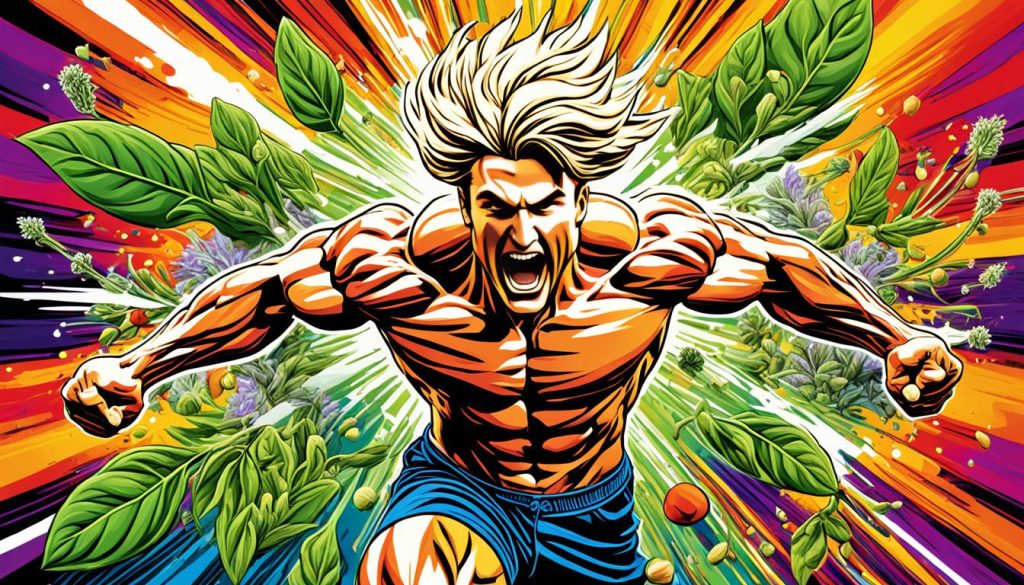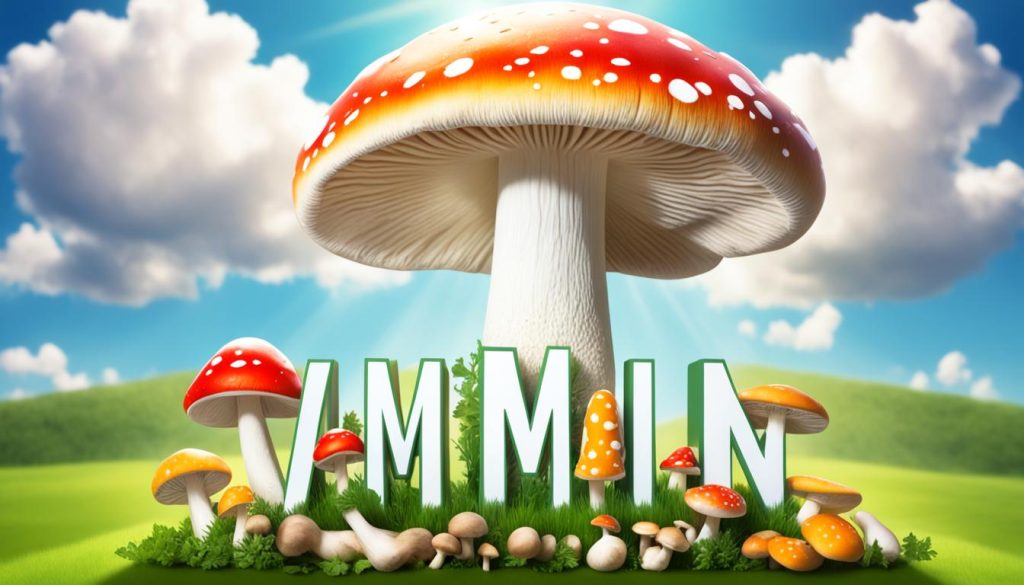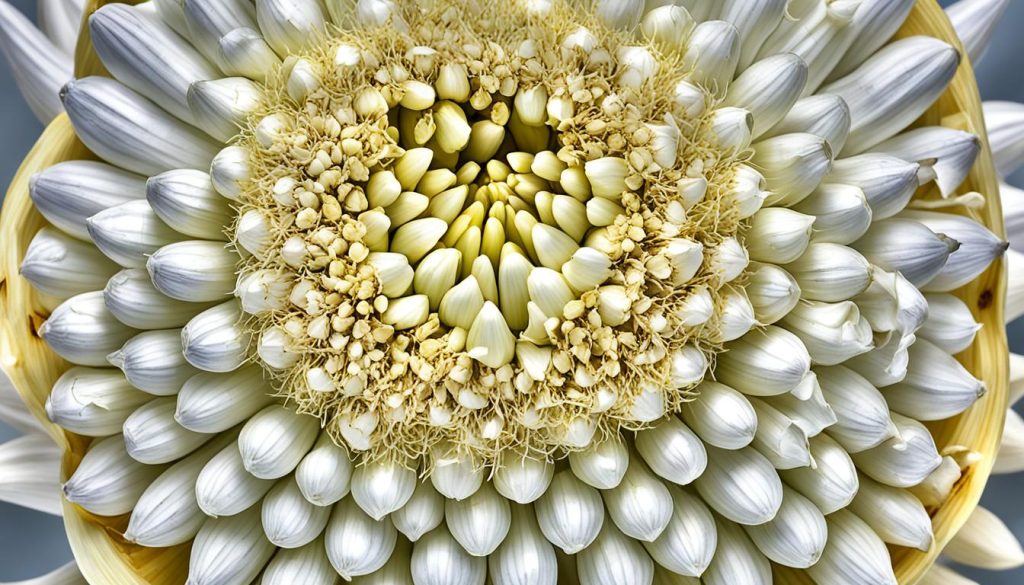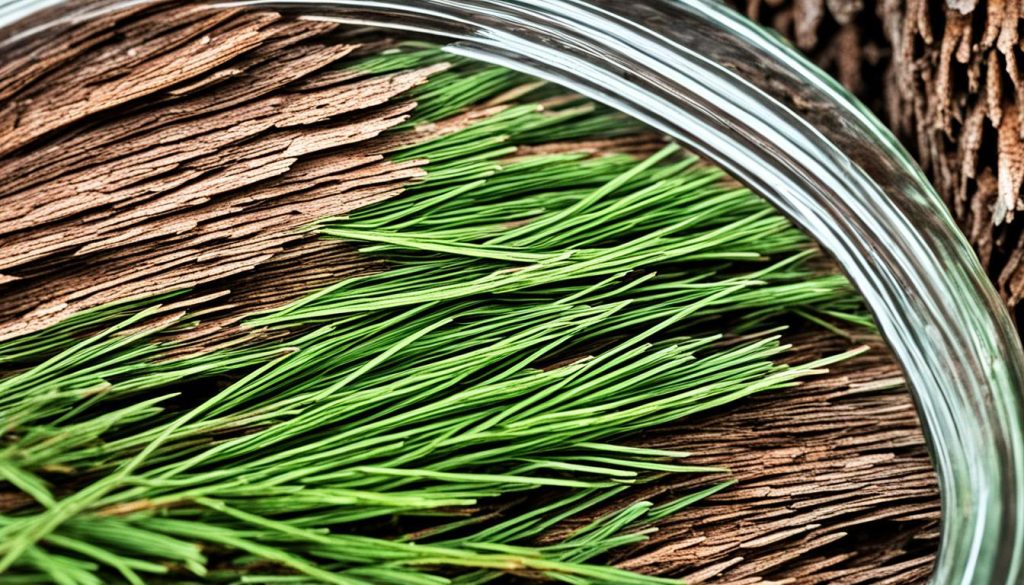Ad Blocker Detected
Our website is made possible by displaying online advertisements to our visitors. Please consider supporting us by disabling your ad blocker.
As we age, our testosterone levels naturally decline, which can lead to symptoms of low testosterone (low T) such as decreased libido, erectile dysfunction, increased body fat, and reduced muscle mass. While there are conventional treatments available, natural remedies like herbs can also help enhance vitality and wellness by boosting testosterone levels.
In this article, we will explore some of the top testosterone boosting herbs that have shown promise in raising testosterone levels or alleviating symptoms of low T. From ancient Ayurvedic medicine to well-researched botanicals, these herbs have been used for centuries and have gained recognition for their potential benefits in hormone balance.
Key Takeaways:
- Testosterone levels naturally decline with age, leading to symptoms of low testosterone.
- Low testosterone can affect sexual drive, energy, physical strength, bone and muscle mass, fat storage, red blood cell production, and overall health.
- Various factors such as health conditions, medication side effects, and excessive alcohol or drug use can contribute to low testosterone.
- Natural remedies like herbs can help boost testosterone levels and alleviate symptoms of low T.
- Consult with a healthcare professional before trying any herb or supplement to ensure they are right for you and to determine the appropriate dosage.
What Is Testosterone and Why Is It Important?
Testosterone is a hormone that plays a crucial role in sexual development and health in both men and women. It is responsible for maintaining bone density, muscle mass, and overall physical and sexual health.
Testosterone levels naturally decline as individuals get older, and drastic drops or a complete stop in production can lead to symptoms of low testosterone (low T). These symptoms can include decreased libido, erectile dysfunction, increased body fat, loss of muscle mass, reduced bone density, fatigue, mood changes, difficulties with memory and concentration, low red blood cell counts, problems with fertility, and swelling.
The prevalence of low T is about 2.1% overall, but it increases with age, affecting an estimated 50% of men over 80 years old. There are several factors that can cause these unexpected changes in testosterone levels, including health conditions, medication side effects, and excessive alcohol or drug use.
It is important to consult with a doctor if concerned about low T and to address any underlying causes of symptoms.
Testosterone levels decline as individuals get older and can lead to symptoms of low testosterone (low T) such as decreased libido and loss of muscle mass.
Vitamins, Herbs, and Supplements for Testosterone
Traditional testosterone replacement therapies involve adding testosterone into the body through injections, implants, or gels. However, there are also vitamins, herbs, and supplements that may help the body make testosterone or alleviate symptoms of low T.
While some alternative treatments are safe for people with low T, it is important to note that many have not undergone rigorous testing in humans. Therefore, it is essential to consult with a doctor before trying any herb or supplement to ensure they are right for you and to determine the appropriate dosage.
It is also important to note that manufacturers of dietary supplements do not need approval from the Food and Drug Administration (FDA), and the FDA does not regulate the quality and safety of herbs, supplements, and vitamins. Therefore, it is crucial to discuss any new herb, supplement, or vitamin with a healthcare professional, as there is a risk of unintended side effects or interactions with other medications.

| Vitamins | Herbs | Supplements |
|---|---|---|
| Vitamin D | Ashwagandha | Zinc |
| Zinc | Garlic | Dehydroepiandrosterone (DHEA) |
| Vitamin A | Pine Bark Extract | Tribulus |
Vitamins
- Vitamin D
- Zinc
- Vitamin A
Herbs
- Ashwagandha
- Garlic
- Pine Bark Extract
Supplements
- Zinc
- Dehydroepiandrosterone (DHEA)
- Tribulus
Incorporating these vitamins, herbs, and supplements into your routine may help support testosterone production and alleviate symptoms of low T. However, it is important to consult with a healthcare professional before starting any new regimen to ensure they are appropriate for you and to determine the correct dosage.
Ashwagandha (Withania somnifera)
Ashwagandha is an adaptogenic herb commonly used in traditional Indian medicine. It has been studied for its potential in enhancing fertility and sexual dysfunction.
“Ashwagandha supplementation can improve testosterone levels, sperm count, sperm motility, and semen antioxidant levels in men experiencing infertility.”
Research has shown that ashwagandha supplementation can improve testosterone levels, sperm count, sperm motility, and semen antioxidant levels in men experiencing infertility. Additionally, ashwagandha has been associated with significant increases in DHEA and testosterone levels.
However, it’s important to note that individual responses to ashwagandha may vary, and it is recommended to consult with a healthcare professional before starting any supplementation.
Vitamin D
Vitamin D, also known as cholecalciferol, is an essential nutrient that plays a critical role in multiple bodily functions. It is known for its ability to fight off bacteria and viruses, protect bones against osteoporosis, and aid in the absorption of calcium. Recent studies have shown that vitamin D supplementation can have a significant impact on testosterone levels, particularly in individuals with vitamin D deficiency.
Research has indicated that men with vitamin D deficiency may experience a significant increase in testosterone levels after receiving vitamin D supplementation. However, it is important to note that this effect may only be observed in individuals who are severely deficient in vitamin D. For men without a deficiency, there may be no noticeable increase in testosterone levels.
The recommended daily dosage of vitamin D for most individuals is 4,000 IU per day. While the body can naturally produce vitamin D through sun exposure, it is advisable to protect the skin with sunscreen to prevent the risk of skin cancer. Consulting with a healthcare professional before starting vitamin D supplementation is crucial, as they can provide personalized guidance based on individual needs and health status.
The Benefits of Vitamin D:
- Aids in the absorption of calcium, benefiting bone health
- Supports the immune system in fighting off bacteria and viruses
- May contribute to elevated testosterone levels, particularly in those with a deficiency
Recommended Daily Dosage:
The recommended daily dosage of vitamin D for most individuals is 4,000 IU per day.
| Effect | Vitamin D | Testosterone Levels | Calcium Absorption |
|---|---|---|---|
| Increase |  |
– | ✓ |
| Neutral | – | – | – |
| Decrease | – | – | – |
Zinc Supplements
Zinc is an essential micronutrient that plays a vital role in various bodily functions, including fighting off invading bacteria and viruses, DNA and genetic material production, and wound repair. Zinc deficiencies have been associated with low testosterone levels and poor sperm quality.
Research has shown that zinc supplements can boost testosterone production in men with zinc deficiencies. However, recent research on the topic is limited, and more studies are needed to confirm the effectiveness of zinc supplementation.
You can obtain zinc through a balanced diet that includes sources such as red meat, poultry, seafood, beans, nuts, dairy products, and fortified breakfast cereals.
The recommended daily dosage of zinc for adult men is 11 mg. It is important to consult with a healthcare professional before taking zinc supplements to determine the appropriate dosage for your specific needs. Excessive zinc intake can have short-term and long-term side effects, so it’s crucial to follow the recommended dosage.
Garlic (Allium sativum)
Garlic, a commonly used herb, has garnered attention for its potential health benefits. Research has shown that garlic may have positive effects on cardiovascular health, immune system support, and cancer prevention.
While animal studies have suggested that garlic consumption can increase testosterone levels, there are currently no human trials on the direct effects of garlic on testosterone levels.
Most garlic supplements available are made from fresh, dried, or freeze-dried garlic. The dosage of garlic supplements may vary depending on the form of garlic used. It is crucial to consult with a healthcare professional before starting garlic supplementation to determine the appropriate dosage for your individual needs.

Garlic has long been recognized for its culinary uses and potential health benefits. It has been employed for centuries in traditional medicine systems for its believed therapeutic properties.
In addition to its potential impact on testosterone levels, garlic has been associated with other health benefits, such as:
- Supporting the immune system through its antimicrobial and immune-boosting properties
- Possibly reducing the risk of heart disease by improving cholesterol levels, reducing blood pressure, and enhancing blood circulation
- Showcasing anticancer properties, primarily in relation to reducing the risk of certain cancers, such as stomach and colorectal cancer
Garlic can be incorporated into your diet through various dishes and recipes. However, if you prefer to take garlic in supplement form, it is essential to consult with a healthcare professional to ensure this is appropriate for you and to determine the correct dosage.
“Garlic has been used for centuries in various cultures for its potential health benefits. While there is limited research on the direct effects of garlic on testosterone levels, it may offer other advantages, such as supporting the immune system, promoting heart health, and potentially reducing the risk of certain cancers.”
Dehydroepiandrosterone (DHEA)
DHEA is a hormone that can be converted into estrogen and testosterone in the body. Some studies have suggested that DHEA supplementation may improve symptoms of low testosterone, such as mood changes, fatigue, and low sexual functioning.
However, the evidence regarding the safety and effectiveness of DHEA supplementation is inconsistent and insufficient. DHEA supplementation may also have potential side effects, such as reduced levels of “good” cholesterol and exacerbation of other hormone-related conditions.
It is crucial to consult with a healthcare professional before considering DHEA supplements.
The Controversy Surrounding DHEA Supplementation
While DHEA has been touted as a potential remedy for low testosterone levels, its efficacy and safety remain a subject of debate. Studies investigating the effects of DHEA on testosterone levels have yielded inconsistent results, with some studies showing positive outcomes, while others have found no significant improvements.
“The evidence regarding the safety and effectiveness of DHEA supplementation is inconsistent and insufficient. DHEA supplementation may also have potential side effects, such as reduced levels of ‘good’ cholesterol and exacerbation of other hormone-related conditions.”
This inconsistency could be attributed to individual variations in hormone metabolism and response to DHEA supplementation. Additionally, the long-term effects and potential risks of prolonged DHEA use are not yet fully understood.
Given the lack of conclusive evidence and potential risks associated with DHEA supplementation, it is essential to consult with a healthcare professional who can evaluate your specific situation and advise on the most appropriate course of action.
| Pros of DHEA Supplementation | Cons of DHEA Supplementation |
|---|---|
|
|
Pine Bark Extract (Pinus pinaster)
Pine bark extract is derived from the bark of the maritime pine tree, scientifically known as Pinus pinaster. This natural extract is rich in a group of compounds called proanthocyanidins, which have been extensively studied for their potential health benefits.

One area of research interest is the effect of pine bark extract on cholesterol levels. Studies have shown that proanthocyanidins can help lower total cholesterol and LDL (“bad”) cholesterol levels, potentially reducing the risk of cardiovascular diseases. The antioxidant properties of pine bark extract may also contribute to its cardioprotective effects.
Furthermore, pine bark extract has been found to enhance cardiovascular health by improving blood flow and supporting the health of blood vessels. These benefits are attributed to the ability of proanthocyanidins to promote the production of nitric oxide, a molecule that helps relax and dilate blood vessels, improving circulation throughout the body.
Reducing symptoms of erectile dysfunction (ED)
Pine bark extract may also provide relief for individuals experiencing erectile dysfunction (ED). Research suggests that the proanthocyanidins in pine bark extract possess vasodilatory effects, meaning they can widen blood vessels and improve blood flow to the penis. This improved blood flow can contribute to better erectile function.
In a study involving men with mild to moderate erectile dysfunction, supplements containing pine bark extract and L-arginine aspartate were found to improve erectile function and increase testosterone levels. These findings highlight the potential of pine bark extract as a natural remedy for ED. However, more research is needed to fully understand its effects on testosterone levels.
It is important to note that pine bark extract supplementation should be approached with caution, and it is advisable to consult with a healthcare professional before considering its use. They can provide personalized guidance based on individual health needs and any existing medical conditions or medications.
Tribulus
Tribulus terrestris is an herb commonly used in Ayurvedic medicine. It has been studied for its potential benefits in treating polycystic ovary syndrome (PCOS) in women and increasing the levels of certain sex hormones, including testosterone, in men.
PCOS is a hormonal disorder that affects women of reproductive age. It is characterized by cysts on the ovaries, irregular menstrual cycles, and symptoms such as acne, weight gain, and excessive hair growth. PCOS can also lead to infertility. Research suggests that tribulus may help regulate the levels of sex hormones in women with PCOS, improving symptoms and increasing the chances of pregnancy.
In men, tribulus has been found to raise testosterone levels by stimulating the production and release of luteinizing hormone (LH) from the pituitary gland. LH helps stimulate testosterone production in the testes. Increased testosterone levels can have various benefits, including improved sexual function, increased muscle mass, and enhanced energy levels.
It is important to note that while tribulus is not as common in the western world, it is important to source it from a reputable company to ensure the quality and authenticity of the supplement. Additionally, it is recommended to consult with a healthcare professional before starting tribulus supplementation to ensure it is safe and appropriate for your individual needs.
Benefits of Tribulus
| Benefit | Explanation |
|---|---|
| Regulates sex hormone levels in women with PCOS | Tribulus may help balance hormone levels in women with polycystic ovary syndrome, improving symptoms and reproductive function. |
| Increases testosterone levels in men | Tribulus stimulates the production of luteinizing hormone, which in turn stimulates testosterone production in men. |
| Enhances sexual function | Increased testosterone levels can improve libido, erectile function, and overall sexual performance. |
| Improves muscle mass and energy levels | Higher testosterone levels can lead to increased muscle growth, strength, and energy levels. |
| Promotes overall vitality and well-being | The hormonal balance achieved through tribulus supplementation can contribute to improved overall vitality and well-being. |
Conclusion
Boosting testosterone naturally can have a significant impact on vitality and overall wellness. While conventional treatments are available, incorporating natural remedies into your routine can help balance testosterone levels and improve your overall well-being. Herbs such as ashwagandha, maca root, ginseng, ginger, pine bark extract, tribulus, and saw palmetto have shown promise in raising testosterone levels and alleviating symptoms of low T.
In addition to herbal remedies, certain nutrients like zinc and vitamin D play a crucial role in testosterone production. It is important to ensure that you have an adequate intake of these nutrients either through diet or supplementation. Regular exercise, stress management, and sufficient sleep are also important for maintaining hormone balance and optimizing testosterone levels.
However, it is important to consult with a healthcare professional before starting any new supplement or implementing lifestyle changes. They can provide personalized advice based on your individual needs and health status, ensuring that the natural remedies you choose are appropriate for you. Ultimately, by taking a holistic approach and incorporating natural remedies into your daily routine, you can support healthy testosterone levels and enhance your vitality and wellness.
FAQ
What is testosterone and why is it important?
Testosterone is a hormone that plays a crucial role in sexual development and health in both men and women. It is responsible for maintaining bone density, muscle mass, and overall physical and sexual health.
What are some vitamins, herbs, and supplements that can help with testosterone production?
Some vitamins, herbs, and supplements that may help boost testosterone production include ashwagandha, vitamin D, zinc, garlic, dehydroepiandrosterone (DHEA), pine bark extract, and tribulus.
Can ashwagandha improve testosterone levels?
Ashwagandha supplementation has been associated with improvements in testosterone levels, sperm count, sperm motility, and semen antioxidant levels in men experiencing infertility. However, individual responses may vary.
Does vitamin D supplementation increase testosterone levels?
Vitamin D supplementation can significantly increase testosterone levels in men with vitamin D deficiency. However, this effect may not be observed in men without a deficiency.
Can zinc supplements boost testosterone levels?
Zinc deficiencies have been associated with low testosterone levels. While older research suggests that zinc supplements can increase testosterone levels in men with deficiencies, more recent research is limited.
Does garlic have any impact on testosterone levels?
While garlic has been shown to increase testosterone levels in animals, there are currently no human trials on the effects of garlic on testosterone levels.
What is DHEA and can it improve testosterone levels?
DHEA is a hormone that can be converted into estrogen and testosterone in the body. Some studies suggest that DHEA supplementation may improve symptoms of low testosterone, but the evidence is inconsistent and insufficient.
Can pine bark extract increase testosterone levels?
Pine bark extract contains proanthocyanidins which have been studied for their potential benefits, including raising testosterone levels. However, more research is needed to determine its full effectiveness.
Can tribulus increase testosterone levels?
Tribulus has been studied for its potential benefits in increasing testosterone levels in men. However, it is important to source tribulus from a reputable company before considering supplementation.
Can natural remedies help with testosterone levels?
Natural remedies such as herbs, vitamins, supplements, lifestyle changes, and exercise can be effective in balancing testosterone levels and promoting vitality and overall wellness.
Are the Testosterone-Boosting Herbs Also Effective for Boosting Libido Naturally?
Looking for natural ways to boost libido? Certain testosterone-boosting herbs like Ashwagandha and Maca have been found to have potential in increasing sexual desire. Along with regular exercise and a healthy diet, these herbs can be beneficial boost libido naturally tips for improving your sex drive.


